- Home
- Keith R. A. DeCandido
DIPLOMATIC IMPLAUSIBILITY Page 8
DIPLOMATIC IMPLAUSIBILITY Read online
Page 8
Leskit grabbed some bregit lung, a handful of gagh, and some rokeg blood pie, and took a seat at the small table where his shift of the bridge crew generally sat. Rodek and Toq were already there—as was, to Leskit’s dismay, Vall.
Leaving aside Vall—which Leskit was happy to do in any case—the three of them made an odd combination. Toq was young, relatively short, but well-built. His beard was unformed and unshaped, as if he hadn’t figured out what to do with it. Yet, for all that he looked like he’d just stumbled out of Defense Force Training a week ago, he moved with a warrior’s confidence, as Kegren had learned to his dismay. He had made himself third in command of the ship.
Rodek, on the other hand, had all the markings of a warrior. He wore a simple mustache in a popular style: beginning above the corners of the mouth and curling down in a crescent shape. Half the men on the ship wore that, including Drex. Rodek was tall, broad, and carried the weight of his years. Yet he never displayed any of the passion Leskit would have expected.
As for Leskit himself, he was old for his rank, but he did not care. Rank was not for him; he knew that none would follow him into battle. His lot was to be led, not to lead, and so he remained a pilot. He fully expected to die a lieutenant, and he was content with that, as long as the death was in battle.
Biting off a talon of pipius claw, Toq said, “This will be a glorious mission.”
“How’s that, Toq?” Rodek asked. “We’re just going back to taD.”
“Yes, but look who we serve with! Already blessed with the Hero of Marcan and the son of Martok, now we have the noble Worf on board!”
Leskit rolled his eyes. “Worf is a Klingon like the rest of us.”
“Less than the rest of us,” Rodek said. “He lives with the Federation.”
“I wouldn’t go that far,” Leskit said. “I served with him during the war. He’s as fine a warrior as you’ll find.”
As he slathered grapok sauce on his racht, Toq said, “He is more than that. He rescued me and many others from Carraya. He taught us the Klingon ways.”
“Didn’t you know them already?” Vall asked.
Toq shook his head. “We were very young when we crashed. I owe Worf more than my life—I owe him my heritage.”
“What does he know of our heritage?” Rodek asked with obvious disdain.
“Enough to tell us of Kahless, and the true meaning of being a warrior. Enough to teach me of the hunt. Enough to tell me who I was. I would not be here if not for him.”
Rodek shrugged and bit through the heart of a targ. “I could say the same, I suppose. He rescued my shuttle when it crashed near that Federation outpost by the Bajoran wormhole. But I don’t let that distract me from the truth.”
Toq glared at the gunner. “And what truth is that?”
“That he remains in the Federation. Wears their colors. They may be our allies, but they are sheep. How can a true warrior live among such as them?”
“He is a true warrior, make no mistake of that,” Toq said, throwing his racht back onto his plate, splattering grapok sauce all over the table.
“You yourself said you only knew about being a warrior from him,” Rodek said, and Leskit had to admit that the gunner had a point.
Toq smiled. “I don’t think Kegren has any doubts about my skills as a warrior, Rodek. Or would you like to find out for yourself?”
Leskit rolled his eyes. “Will you two calm down, please? We’re trying to eat. Besides, splattered blood will ruin the taste of my dinner.”
Vall spoke up in that Ferengi-like whine of his, which was almost enough to put Leskit off his feed. “Actually,” he said, “Worf was raised in the Federation. Until they made him ambassador, he was highly decorated by Starfleet.”
“Decorated for what? Charting solar systems?” Rodek said with a sneer while wiping his hands on his uniform.
“No, he fought against the Borg, the Cardassians, the Romulans, the Jem’Hadar, the Ferengi, the Tamarians,” Vall said in a cadence-free drone. “He was one of the first people ever to see a Borg. He helped rescue Captain Picard after the Borg captured him, as well. He’s—”
“Enough!” Leskit cried. “I like to sleep after dinner, Vall, not before I’ve finished it.”
“None of that explains why he joined Starfleet,” Rodek said.
Vall said, “His family was killed at the Khitomer massacre, and he was rescued by a Starfleet ship. A Starfleeter raised him, and then when he was old enough, he went to their Academy.”
“A debt of honor,” Toq said with a nod.
Rodek looked at Vall with a questioning gaze. “Khitomer massacre? What are you talking about?”
Leskit blinked. “Thirty years ago, Rodek. You were only a boy then, but you must have heard about it. A Romulan attack?”
“I know Khitomer is where the treaty with the Federation was signed after Praxis was destroyed, but—” Rodek hesitated. “I’m sorry, but my memory is filled with—gaps. That crash left me badly damaged. I don’t remember anything of my life before then.”
Toq laughed a contemptuous laugh. “And you accuse Worf of being a false Klingon? You, who have only been Klingon for a few years.”
Rodek stood, throwing his chair to the deck. The ends of his mustache flared as he cried, “I am as much a Klingon as you, boy! If you doubt it, a demonstration can be arranged.”
The mess hall fell silent. Toq matched Rodek’s gesture, the clattering of his own chair now the only sound in the hall. Toq stood eye to eye with the gunner. “I have already killed one fool on this ship, Rodek. I’ll be happy to make it two.”
Wearily, Leskit said, “If you two are going to kill each other, just get it over with. All this yelling is adding to the headache I got from B’Elath’s song.”
“I thought she sang it very well,” Vall said.
Leskit bit his tongue.
Toq and Rodek glowered at each other for another moment. Leskit feared that they would actually fight, meaning yet another delay in dinner while everyone watched these two idiots try to kill each other.
Then, finally, Rodek retrieved his chair and sat down. “I have no interest in the second officer’s position. And Morketh isn’t ready to take over as gunner just yet.”
Toq laughed and also recovered his seat. “You may justify your cowardice any way you wish, Rodek. When your spine regrows, you will find my d’k tahg as eager to taste your blood as it was Kegren’s.”
As the pair of them went back to their food, Vall looked at Leskit. “Lieutenant—are those real Cardassian neckbones?”
Idly, Leskit fingered the necklace made of bones that he always wore. He had contemplated removing the trophy once the war ended, but he got a certain pleasure out of the looks he got from the younger warriors when they saw it. Vall, in fact, had that look on his face right now. “Oh, yes,” he said. “They came from real Cardassians. Or at least, formerly real ones.”
“Those are difficult to dislodge, from what I hear.”
Shaking his head, Leskit thought, A true warrior wouldn’t need to add that last phrase. He took a bite of the rokeg blood pie. “This is good,” he said with some surprise. He’d had blood pie his first night on the Gorkon and left it unfinished, it was so inedible. The subsequent month had dulled the bad aftertaste, and the food smelled good enough tonight that Leskit had decided to give it another shot. Obviously, he thought, someone has tinkered. “A pity Kurak isn’t here,” he said aloud. “I’d congratulate her on the food replicators myself.”
“You’re wasting your time, Leskit,” Rodek said. “I served with Kurak on the Lallek. You’d have a better chance ‘congratulating’ the matter/anti-matter chamber.”
“I’ll see for myself, if it’s all the same to you, Rodek.”
“Actually,” Vall said, while attempting to puff himself up like a beast who had cornered its prey, “I was the one who conquered the replication matrix’s inability to provide proper sustenance.” Then he deflated somewhat, looking more like the Grishnar cat he
truly resembled. “And I would rather you did not tell Commander Kurak, since she ordered me not to.”
Toq laughed. “You disobeyed an order?”
“Well, not exactly.” Vall squirmed a bit. “She didn’t specifically order me not to upgrade the replicators—but every time I suggest such an upgrade, she objects. I had mapped out a magnificent battle plan for modifying the ODN conduits, only to have her scream at me about only doing what she tells me to do.”
Leskit shook his head as he chewed on his blood pie. Battle plan for modifying the ODN conduits? Give me strength. . . .
Toq frowned. “Why would she wish you not to improve the ship’s systems?”
Vall shrugged. “I do not know. But the food replicators were not worthy of this vessel, so I defeated the pattern enhancers and put new ones in their place—these enhancers are twice as powerful as the ones that—”
“Enough!” Leskit cried again. “I’d rather listen to those two fight over Worf again than listen to you drone, Vall.”
“My apologies, Lieutenant, but—this is a great ship, but there are so many ways it could be made even more worthy.”
“A new assistant chief engineer would be a fine start,” Rodek said.
All three of them laughed. Vall sulked. A pity such brilliant talent is trapped in such a repugnant form, Leskit thought. He wondered if he would be doing the boy a favor by killing him rather than forcing him to endure continuing to live as—well, as Vall.
Then he took another bite of the excellent blood pie, and decided that, if Vall could live with himself, so could Leskit.
“Alert status!”
Rodek’s voice on the speakers making this announcement, combined with the sound of the alarm, startled Worf awake. He took all of a nanosecond to remember where he was—the feeling of the metal slab under his back meant he was on a Klingon ship, which in turn brought his current mission back to his quickly awakening conscious mind.
Then he rose from the bed—a padd that had rested on his chest clattering to the floor—and went to the computer station on the desk, inputting commands for the view from the bridge’s security camera. This required access codes that a Federation ambassador normally would not possess—but most Federation ambassadors hadn’t served on Klingon ships, nor had lengthy tenures in Starfleet security.
Wu got up groggily from his bed and stood behind Worf to observe as well, pausing to retrieve the padd and place it on the table with the others. Worf had fallen asleep while working on the specifications for a portable scattering field generator—which could temporarily disable any handheld disruptor weapons within a certain radius.
The camera was positioned just below the bridge’s viewscreen. Klag sat in his command chair, leaning slightly forward, gazing straight at the viewscreen with an eager face—appropriate for one going into battle. Drex was moving aft toward Toq’s station. Toq looked even more eager than Klag. Next to him at the gunner’s station, Rodek looked more impassive. Off to the side, Leskit looked almost bored—but Leskit always looked like that.
“Damage report,” Drex barked.
“Shields holding,” said Rodek. “No appreciable damage.”
“The ship is running away,” Toq said. “Course eight-three-seven mark nine.”
Worf called up the tactical schematics. The ship had come screaming toward the Gorkon at Warp 9.7, fired a salvo of phasers, then had, as Toq said, run. It had come in too fast for sensors to get a positive identification.
Drex asked, “Do we pursue, Captain?”
Klag shot Drex a harsh look. “Of course. Pilot, change course to intercept, maximum warp. Gunner, the second we’re in range, fire on the enemy and destroy them.”
Leskit said, “We will intercept in seven minutes.”
Drex walked fore and leaned toward Klag. Speaking in a voice meant not to be heard by anyone on the bridge other than the captain, he said, “Captain, the ambassador may object to this course change.”
Klag regarded his first officer with disdain. “Let him.”
Worf stood up.
“Let me guess,” Wu said, “you’ll be on the bridge?”
“Good guess,” Worf said dryly as he left the cabin.
Krevor silently followed.
The moment the doors parted to let Worf in, Klag, without even turning around, said, “Ambassador, this is not a good time.”
“Have you identified the ship that fired on us?”
Now Klag did turn. “Not yet,” he said slowly.
“It might be wise to do so before engaging them again.”
“Ambassador,” Klag said, standing to face Worf, “this is not your concern. We will swat this glob fly and resume our course to taD.”
“Anything that affects this mission is my concern, Captain. However, this attack on the Gorkon cannot go unanswered. Commander Drex’s fears about my objections were unfounded.”
Klag glowered at Worf, who simply stared back. The captain seemed to want to pursue the issue—or at least question Worf about his ability to navigate the Gorkon’s security systems—but Worf had just given Klag what he wanted. Worf suspected that Klag had anticipated a fight.
Perhaps even desired one? Worf wondered. Klag had looked decidedly unhappy when Martok announced that Worf commanded the mission.
Leskit interrupted: “Less than a minute to intercept.”
Klag turned from Worf and sat back in the command chair. “Rodek?”
From behind Klag, the man who was once Worf’s brother said, “Disruptors ready, Captain. Awaiting target.”
Worf’s heart sank. Rodek spoke with an appalling lack of passion. Worf remembered serving with Kurn on the Hegh’ta during the civil war between Gowron and Duras’s sisters. He had a fire, a passion for combat that did Worf proud.
“In range,” Toq said eagerly.
“Weapons firing.” Rodek sounded barely interested in the concept. “They have dropped out of warp.”
“Stay with them, pilot,” Klag said.
“It is a Kreel vessel, Captain,” Toq said.
Worf blinked. Even if he had objected to this diversion, that objection would be gone the minute he learned it was Kreel they faced. That race of carrion-pickers had been at odds with the Klingons for centuries. They were like Earth vultures, picking at the bones of the empire’s conquests, but never doing any conquering themselves. Defense Force vessels had standing orders to destroy any Kreel ship that dared to challenge them.
Toq added, “But they have made modifications. That’s why we couldn’t identify them at first—they have Breen shields.”
Pirated or obtained legitimately? Worf wondered. When the mission was over—if not sooner—he needed to report this to Starfleet Intelligence.
“Destroy them, gunner,” Klag said.
“Quantum torpedoes locked on target, and firing.” Worf turned to the viewscreen. Now that he got a good look at it, it was definitely a Kreel vessel they faced. The torpedo exploded upon impact against the Kreel’s Breen shields.
“Minimal damage,” Rodek said.
Klag stood up. “Minimal? Are our torpedoes malfunctioning?”
“Weapons are at peak efficiency, Captain. Their shields are simply too—”
Rodek was cut off by the impact of phaser blasts on the Gorkon’s shields.
Drex bellowed, “Damage report!”
“Shields at forty-nine percent,” said Rodek.
“Captain,” Toq said. “The Kreel’s matter/anti-matter pods are starting to fluctuate. No, wait.” He gazed at his console. “Returning to normal. But they came close to a critical reaction when our torpedo hit.”
Klag sat back down and smiled. “Engineering, increase power to shields. Gunner, full spread of torpedoes.”
“Aye, sir.”
Kurak’s voice came through the intercom. “You have full shields again, Captain.”
Worf blinked in surprise. He knew tactical systems in general quite well, and had studied the Gorkon’s specs on the Enterprise. He didn’t se
e how fifty-one percent of the shields’ power could be restored that quickly.
Klag, however, didn’t question this good fortune. He clenched his one fist. “Fire!”
Worf frowned as he observed the dispersal pattern of the torpedoes. It was the default spread: focused on one area of the shields, to batter that section at several points in the hopes of collapsing the shields. Given the apparent situation—that the Breen shields’ power consumption was barely within the Kreel ship’s tolerances—it would have made more sense to widen the spread to hit as many different points around the ship as possible and increase the strain.
That, he thought, would require a tactical officer withsome imagination. Klag proceeded on the assumptionthat he had one. Rodek wasn’t wrong—but Kurn would have widened the spread.
“Kreel shields at eighty percent,” Rodek said.
Toq added, “Kreel matter/anti-matter pods fluctuating. Containment breach in forty seconds.”
“Move us out of the blast range, pilot,” Klag ordered, “Warp 1.”
“Gladly, sir,” Leskit said.
Within seconds, the Kreel ship exploded in a fiery barrage.
Cheers erupted throughout the bridge. An officer at an aft station cried, “Death to the Kreel!”
Leskit smiled. “Today was a good day for them to die.”
Klag pounded the arm of his chair and laughed. “Well done, my soldiers, well done. That’s one ship’s worth of Kreel that no longer infest the galaxy. Pilot, resume course to taD, Warp 6.”
The last two words were said while Klag looked right at Worf, and the ambassador saw the challenge in the captain’s eyes. They had been proceeding at Warp 6 since parting ways with the Enterprise and the Sword of Kahless, but between the delay and significant course changes necessitated by the Kreel battle, remaining at that speed would bring them to taD several hours behind schedule. Klag had all but dared Worf to challenge his decision.
Worf refused to rise to the bait. The situation on taD had gone on for several years; a few hours would make little difference. “I will be in my quarters, Captain,” he said, and turned on his heel and left.
As soon as he entered his quarters, Krevor again taking up position outside his door, he asked Wu, “Did you monitor the battle?”

 Alien
Alien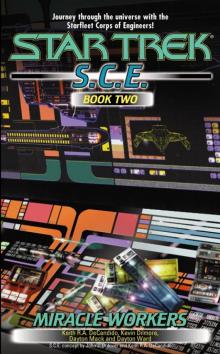 Miracle Workers
Miracle Workers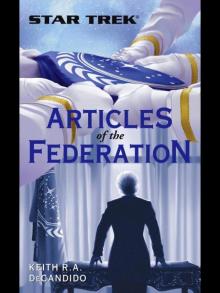 Articles of the Federation
Articles of the Federation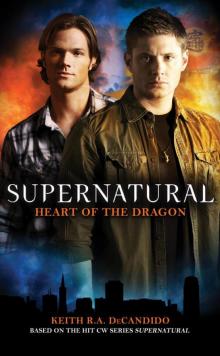 Supernatural Heart of the Dragon
Supernatural Heart of the Dragon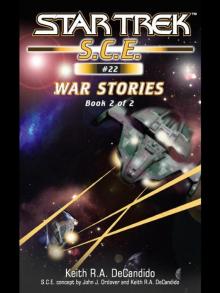 War Stories: Book Two
War Stories: Book Two The Zoo Job
The Zoo Job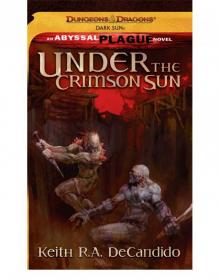 Under the Crimson Sun
Under the Crimson Sun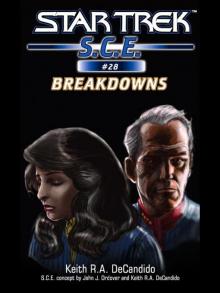 Breakdowns
Breakdowns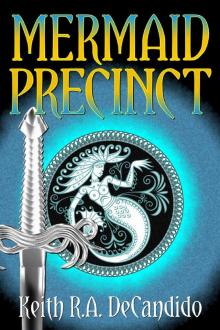 Mermaid Precinct (ARC)
Mermaid Precinct (ARC)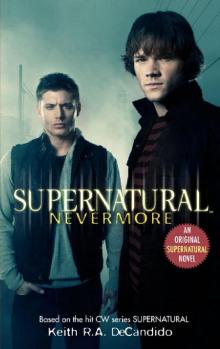 Supernatural 1 - Nevermore
Supernatural 1 - Nevermore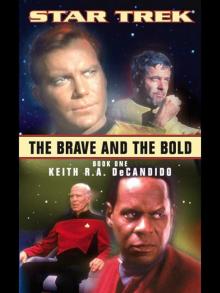 STAR TREK - The Brave and the Bold Book One
STAR TREK - The Brave and the Bold Book One Four Walls
Four Walls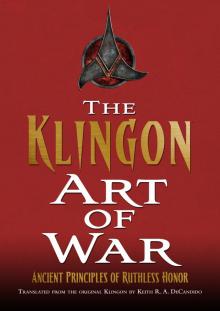 The Klingon Art of War
The Klingon Art of War Blackout
Blackout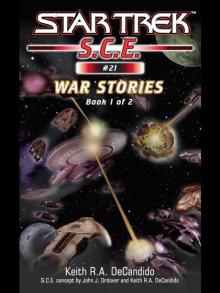 War Stories: Book One
War Stories: Book One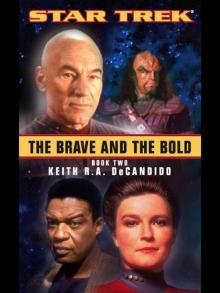 The Brave and the Bold Book Two
The Brave and the Bold Book Two Honor Bound
Honor Bound Sleepy Hollow: Children of the Revolution
Sleepy Hollow: Children of the Revolution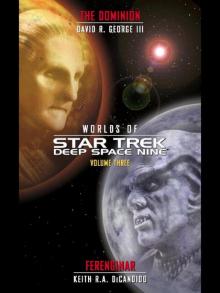 Worlds of Star Trek Deep Space Nine® Volume Three
Worlds of Star Trek Deep Space Nine® Volume Three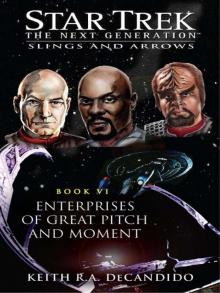 Star Trek: TNG: Enterprises of Great Pitch and Moment
Star Trek: TNG: Enterprises of Great Pitch and Moment Genesis
Genesis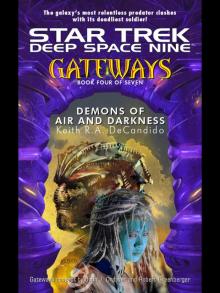 Demons of Air and Darkness
Demons of Air and Darkness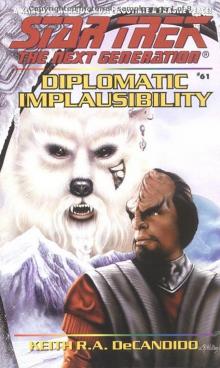 Star Trek - TNG - 61 - Diplomatic Implausibility
Star Trek - TNG - 61 - Diplomatic Implausibility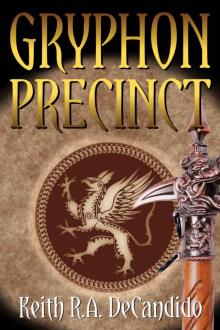 Gryphon Precinct (Dragon Precinct)
Gryphon Precinct (Dragon Precinct)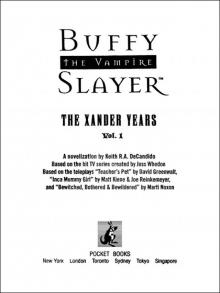 THE XANDER YEARS, Vol. 1
THE XANDER YEARS, Vol. 1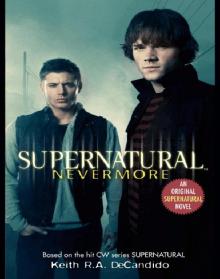 Nevermore
Nevermore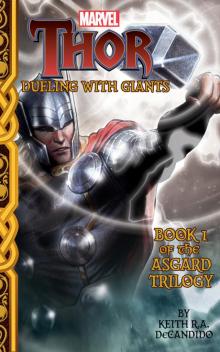 Thor
Thor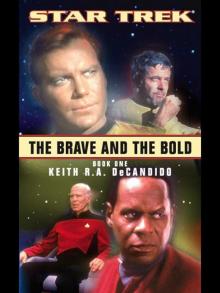 The Brave And The Bold Book One
The Brave And The Bold Book One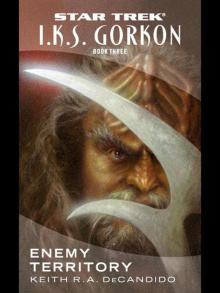 I.K.S. Gorkon Book Three
I.K.S. Gorkon Book Three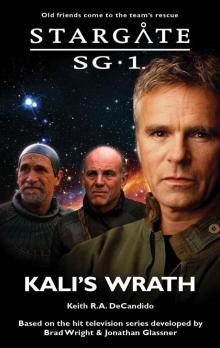 STARGATE SG-1: Kali's Wrath (SG1-28)
STARGATE SG-1: Kali's Wrath (SG1-28)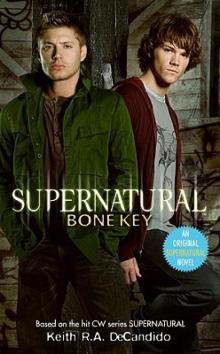 Bone Key
Bone Key Guilt in Innocece
Guilt in Innocece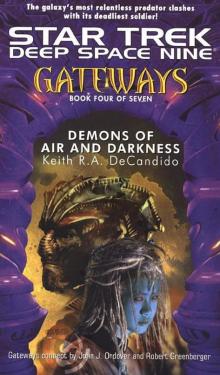 Star Trek - DS9 Relaunch 04 - Gateways - 4 of 7 - Demons Of Air And Darkness
Star Trek - DS9 Relaunch 04 - Gateways - 4 of 7 - Demons Of Air And Darkness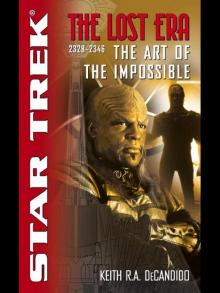 The Art of the Impossible
The Art of the Impossible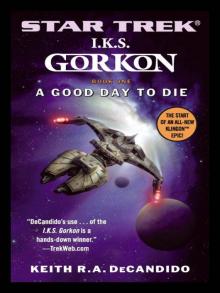 I.K.S. Gorkon Book One: A Good Day to Die
I.K.S. Gorkon Book One: A Good Day to Die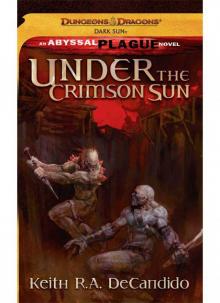 Under the Crimson Sun (the abyssal plague)
Under the Crimson Sun (the abyssal plague)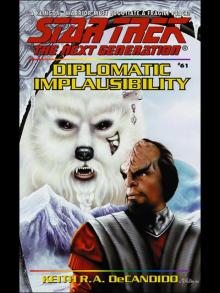 DIPLOMATIC IMPLAUSIBILITY
DIPLOMATIC IMPLAUSIBILITY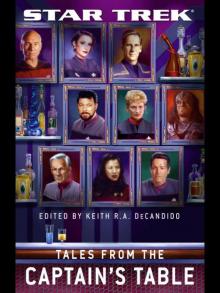 Tales from the Captain's Table
Tales from the Captain's Table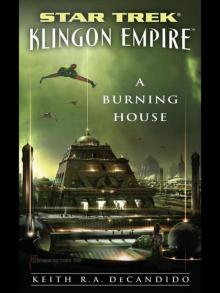 A Burning House
A Burning House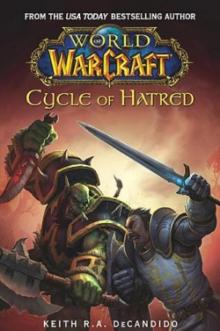 Cycle of Hatred (world of warcraft)
Cycle of Hatred (world of warcraft)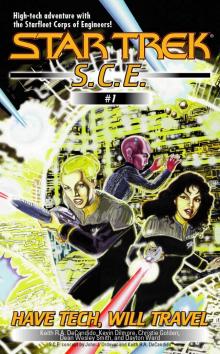 Have Tech, Will Travel
Have Tech, Will Travel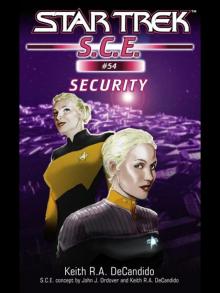 Security
Security